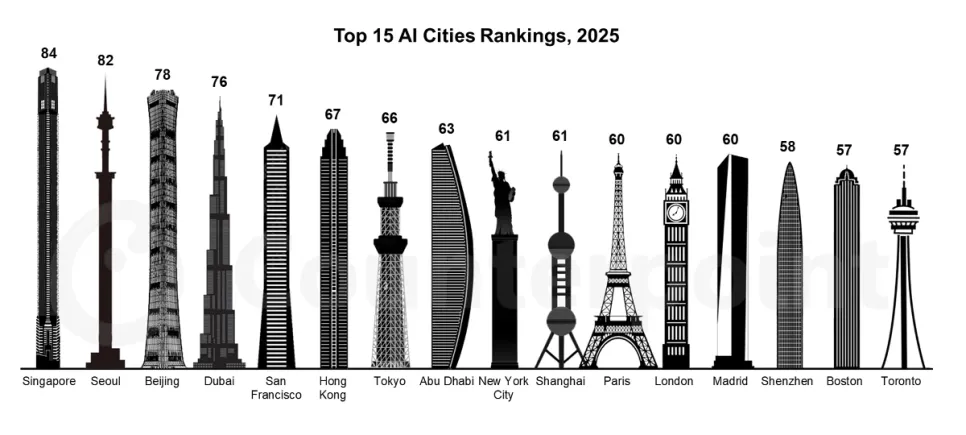Singapore Named World's Top AI City by Counterpoint Research
Singapore has been ranked the world’s top AI city in Counterpoint Research’s recently published 2025 Global AI Cities Index.

Singapore has been ranked the world’s top AI city in Counterpoint Research’s recently published 2025 Global AI Cities Index. The study on the adoption of AI tracks the one hundred largest metropolitan areas around the world.
According to the report, Singapore is followed by Seoul, Beijing, Dubai, and San Francisco to round out the top five. Counterpoint Research said that in the study, it analyzed over 5,000 initiatives in the private and public sectors, including the strength of communications infrastructure, university output, and the strength of the startup ecosystem, among other factors.
Singapore came out on top as the city has enacted a variety of government initiatives through organizations like AI Singapore, which has created a vibrant startup ecosystem and, more importantly, a strong collaborative alliance between the public and private sectors in industries such as healthcare, transportation, and telecommunications.
Seoul was not far behind as the Seoul Metropolitan Government has been actively implementing AI in verticals such as healthcare and education, while companies such as SK Telecom and Naver are pushing the envelope in terms of AI service innovation. Beijing ranked third in the study. The city has announced formal AI education training for all primary and secondary school students starting in 2025. China Unicom and Huawei have also implemented several 5G + AI initiatives in Beijing. At the regional level, North America is still in the lead in terms of AI city development by a decent margin, but China is catching up.
"AI city development in China is no longer limited to the biggest cities. Places like Wuhan, Chengdu, and Suzhou are also embracing AI quickly. Investments, especially in supercomputing, are impressive, and the gap between North America and China will certainly narrow from next year onwards," said Marc Einstein, Research Director at Counterpoint Research. He added that Europe only had about half of the activity level as North America due to a more difficult regulatory environment. He also said the Middle East is the region to watch going forward. Einstein also noted some surprises in the study. For example, Dubai actually outscored San Francisco as the government is making massive investments in AI across all sectors of the economy, from energy to media production.
“The city has an AI strategist in every government department. All teachers are now being given AI training, and they have the ‘One Prompter’ program to train one million AI engineers. They are clearly investing in the future, and Abu Dhabi is not far behind," Einstein said. Riyadh, the seat of Saudi Arabia's $100-billion AI investment initiative; Bengaluru, India's Silicon Valley; and Hangzhou, the Chinese birthplace of DeepSeek, are also important cities to watch out for in this latent AI-city race.
Global Tech Vendors also play an important role in AI city development. In the 2025 AI City Index report, Microsoft emerged as the most active vendor as the company expanded its AI datacenter footprint significantly, engaged in several AI training initiatives, and set up new AI innovation hubs in cities like London and Sydney. Other tech giants, such as Google and Amazon, with a global footprint and massive software, cloud, and AI technology influence, were not far behind as they also expanded their AI datacenter footprints and partnered with governments, universities, and enterprises in several verticals. NVIDIA was particularly active in the supercomputing space, launching a new facility in Copenhagen and partnering with telcos, such as du in Dubai and FastWeb in Milan. NVIDIA has also been pushing for partnerships to accelerate local Sovereign AI initiatives.
Telco infrastructure plays an important role in AI City development, both on the fixed and wireless fronts. Beijing Telecom is deploying 10G fiber throughout the city to enable AI-driven applications, while in Boston, Verizon is also increasing capacity to handle bigger AI workloads. AI is starting to play a bigger role in mobile network management as Airtel has been blocking one million spammers daily in Delhi, and in Riyadh, STC has been using AI to automate 5G network traffic during the Riyadh Season festival. Companies like Singapore's Singtel are starting to offer new products like GPU-as-a-Service. In Osaka, SoftBank and KDDI are investing heavily in AI datacenters, and in Toronto, Rogers is using 5G to control its CCTV security cameras.